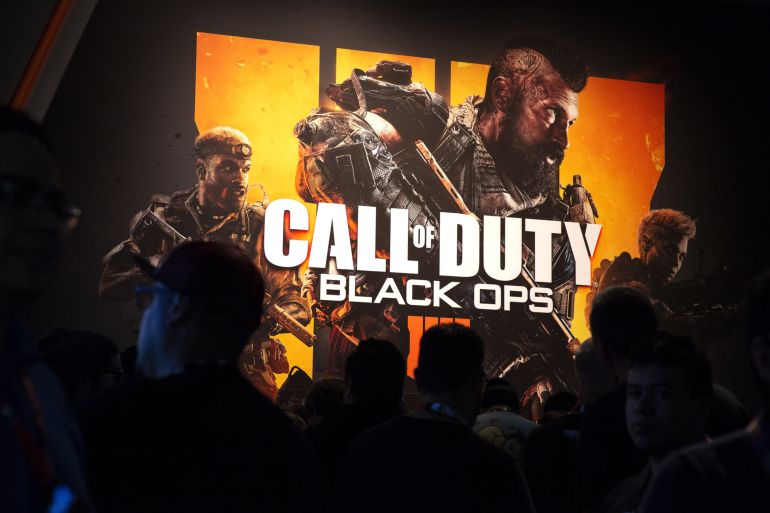US sues to block Microsoft buying ‘Call of Duty’ maker Activision
Antitrust regulator FTC said Microsoft had a record of buying valuable gaming content and using it to suppress competition

The United States trade regulator has filed a complaint aimed at blocking tech giant Microsoft’s $69bn bid to buy “Call of Duty” games maker Activision over concerns the deal would deny rivals access to popular games.
Microsoft, which owns the Xbox, said in January 2022 that it would buy Activision for $68.7bn in the biggest gaming industry deal in history.
Keep reading
list of 3 itemsGriner’s release raises fresh concerns about fate of Paul Whelan
Is Germany at risk of violent plots by far-right groups?
In its complaint on Thursday, the Federal Trade Commission, which enforces antitrust law, said Microsoft had a record of buying valuable gaming content and using it to suppress competition from rival consoles.
“Microsoft has already shown that it can and will withhold content from its gaming rivals,” said Holly Vedova, director of the FTC’s Bureau of Competition. “Today, we seek to stop Microsoft from gaining control over a leading independent game studio and using it to harm competition in multiple dynamic and fast-growing gaming markets.”
Microsoft President Brad Smith said the company would fight the FTC. “While we believed in giving peace a chance, we have complete confidence in our case and welcome the opportunity to present our case in court,” he said.
The decision to sue comes as US President Joe Biden’s administration takes a more aggressive approach to antitrust enforcement. The US Department of Justice recently stopped a $2.2bn merger between Penguin Random House, the world’s largest book publisher, and smaller US rival Simon & Schuster.
Shares in Microsoft and Activision fell on news of the FTC’s complaint. Activision shares were down 2.3 percent at $74.19 per share, while Microsoft slipped from earlier highs but was still trading at nearly 1 percent higher for the day at $246.31.
Microsoft had said it wanted its purchase of Activision to help it compete with gaming leaders Tencent and PlayStation owner Sony, which has criticised the deal.
The FTC said it was concerned Activision’s popular games, including “World of Warcraft” and “Diablo”, would not continue to be offered on a range of consoles, PCs and mobile devices.
While Microsoft has suggested concessions to address competition concerns, the rapid pace of change in the tech and gaming industries could make those conditions useless over time.
To woo regulators, shortly after the deal was announced, Microsoft laid out a new set of principles for its app store, including open access to developers who meet privacy and security standards.
And in December, in another move to blunt criticism, Microsoft entered into a 10-year commitment to bring “Call of Duty” to Nintendo platforms, which would be the first time the popular first-person shooter series was available on Nintendo. Microsoft made the same offer to Sony.
Chair Lina Khan and the two Democrats on the commission voted to approve the complaint, while Commissioner Christine Wilson voted “no”.
Activision Blizzard CEO Bobby Kotick told employees on Thursday he was confident the deal would go forward.
“The allegation that this deal is anti-competitive doesn’t align with the facts, and we believe we’ll win this challenge,” he said, adding he believed the companies’ arguments would win “despite a regulatory environment focused on ideology and misconceptions about the tech industry”.
Headwinds abroad
The deal also faces regulatory headwinds in Europe.
As of late November, Microsoft was expected to offer remedies to European Union antitrust regulators in the coming weeks to stave off formal objections to the deal, people familiar with the matter said. The deadline for the European Commission to set out a formal list of competition concerns, known as a statement of objection, is in January.